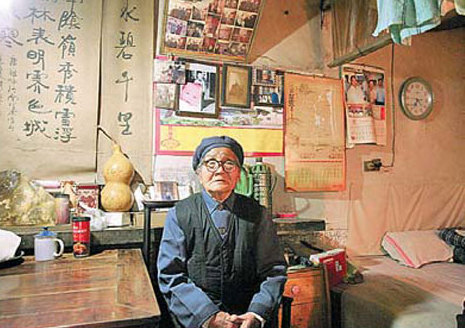
The 94-year-old Ma Yuying lives in the simple house and prefers village life. (China Daily/Ju Chuanjiang)
Among them, the well-preserved Zhaojia Bridge dating back to the Qing Dynasty (1644-1911) stands out. The single-arched bridge is about 5 meters high and is completely made of natural stones. It is composed of two levels of roads, one on top of the other.
Two temples in the village catch our attention. They are said to be built in the late Qing Dynasty. One house the statue of Wenchang and the other, statue of Kuixing - both considered the gods of literature in Chinese mythology. The two temples are special because most temples in rural areas are places of worship for the god of wealth, or Guanyin, the goddess of mercy.
"Education has long been valued in Zhujiayu, judging from the number of sishu or old-style private institution in the village. There used to be as many as 17 sishu, and the first female-only school in Shandong province," explains Zhai Bocheng, secretary-general of Zhangqiu Cultural and History Research Institute.
One of the sishu of the Qing Dynasty is still there in the village. The main building comprising a bedroom, a study room and a kitchen, remain in good condition, but a two-story hall which used to store books looks dilapidated.
The tutor, Zhu Fengyin, was rated as Jinshi, a successful candidate at an imperial examination during the reign of the Qing emperor of Guangxu. A tablet inscribed by the emperor to praise his talents is still hung on the wall.
Zhu's 94-year-old granddaughter-in-law, Ma Yuying, still lives in the simple house. Her sons have tried persuading her to live with them in the city center, but she is not keen.
"I love the village and can't leave here. The air is good and the spring water tastes sweet. Every time my children come to see me, they will always bring several empty barrels to collect water to bring home," Ma says with a smile.
Like Ma, many of the elderly in the village lead a traditional lifestyle. They grow peanut and Chinese walnut on the mountains, process grains with stone mill, and cook with spring water.
But most young and middle-aged people have moved to the big cities, leaving their houses empty.
"There are now only 200 people living in the old village and most of them are over the age of 70," says Zhao Zhongwen, director of Zhujiayu Village Office.
